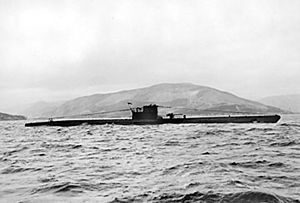German submarine U-901 facts for kids
class="infobox " style="float: right; clear: right; width: 315px; border-spacing: 2px; text-align: left; font-size: 90%;"
| colspan="2" style="text-align: center; font-size: 90%; line-height: 1.5em;" | 
|} The German submarine U-901was a special type of submarine called a Type VIIC. It was built for Nazi Germany's navy, the Kriegsmarine, during World War II. Work on U-901began on January 1, 1942, in a city called Stettin. It was officially launched into the water on October 9, 1943. The submarine was ready for duty on April 29, 1944, with Hans Schrenk as its commander.
Contents
| History | |
|---|---|
| Name | U-901 |
| Ordered | 10 April 1941 |
| Builder | Stettiner Maschinenbau AG, Stettin |
| Yard number | 14 |
| Laid down | 1 January 1942 |
| Launched | 9 October 1943 |
| Commissioned | 29 April 1944 |
| Fate | Surrendered on 15 May 1945; sunk as part of Operation Deadlight on 5 January 1946 |
| General characteristics | |
| Class and type | Type VIIC submarine |
| Displacement |
|
| Length |
|
| Beam |
|
| Height | 9.60 m (31 ft 6 in) |
| Draught | 4.74 m (15 ft 7 in) |
| Installed power |
|
| Propulsion |
|
| Speed |
|
| Range | |
| Test depth |
|
| Complement | 4 officers, 44–52 enlisted |
| Armament |
|
| Service record | |
| Part of: |
|
| Commanders: |
|
| Operations: |
|
| Victories: | None |
How the U-901 Was Designed
The U-901 was a Type VIIC submarine. These submarines were a common type used by Germany during the war. They were designed to be strong and efficient underwater vehicles.
Size and Power
When U-901 was on the surface, it weighed about 769 tonnes (757 long tons). When it was underwater, it weighed more, about 871 tonnes (857 long tons). The submarine was about 67.10 m (220 ft 2 in) long. That's longer than two basketball courts!
To move on the surface, U-901 used two powerful diesel engines. These engines gave it a top speed of 17.7 knots (32.8 km/h; 20.4 mph) (knots). When it was underwater, it switched to two electric motors, which allowed it to travel at 7.6 knots (14.1 km/h; 8.7 mph). It could travel about 8,500 nmi (15,700 km; 9,800 mi) on the surface without needing to refuel. Underwater, it could go about 80 nmi (150 km; 92 mi) before needing to surface. The submarine could dive to a depth of about 230 metres (750 ft).
Weapons and Crew
U-901 was equipped with several weapons. It had five torpedo tubes, which could launch torpedoes. Four of these tubes were at the front, and one was at the back. It could carry 14 torpedoes or 26 mines.
For defense against aircraft and other ships, it also had a large 8.8 cm (3.46 in) deck gun. It also carried anti-aircraft guns, including a 3.7 cm (1.5 in) Flak M42 and two twin 2 cm (0.79 in) C/30 anti-aircraft guns. The submarine needed a crew of about 44 to 52 people to operate it.
U-901's Journey
U-901 was part of the 4th U-boat Flotilla from April 1944 to March 1945. After that, it joined the 11th U-boat Flotilla until the war ended in May 1945. Its commander for its entire service was Hans Schrenk.
The submarine went on only one war patrol, which lasted from April 14 to May 15, 1945. During this patrol, U-901 did not sink or damage any enemy ships.
The End of Its Service
As World War II was ending, U-901 surrendered to the Allied forces on May 15, 1945, in Stavanger, Norway. It was then moved to Lisahally on May 27, 1945.
U-901 was one of 116 German submarines chosen to be sunk as part of an operation called Operation Deadlight. This was done to prevent them from being used again. U-901 was towed out to sea and sank on January 5, 1946. The exact reason it sank that day is not known. Its remains now lie underwater at 55°50′N 08°30′W / 55.833°N 8.500°W.
 | Selma Burke |
 | Pauline Powell Burns |
 | Frederick J. Brown |
 | Robert Blackburn |

